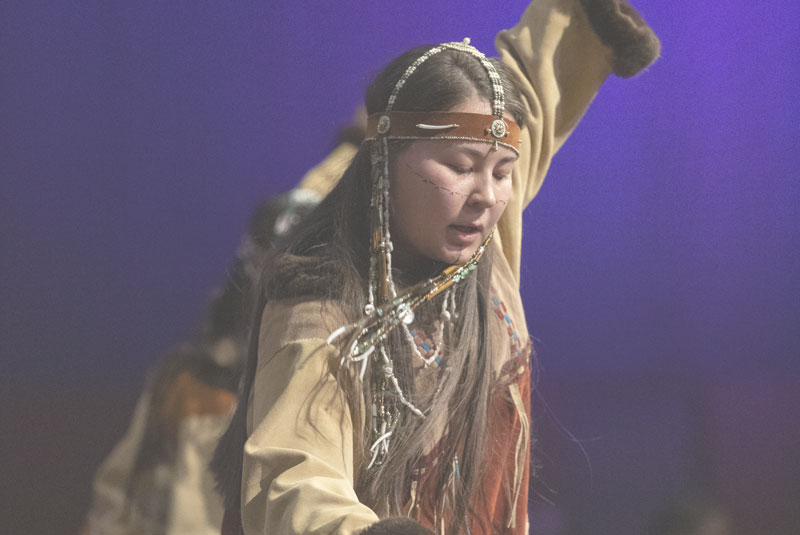Journalism and Public Communications B.A.
Explore the journalism and public communications bachelor’s degree program at the 99�þþ�Ʒ
Alaska has complex stories to tell, and you can help share them. With an emphasis
on ethics, 99�þþ�Ʒ’s Bachelor of Arts degree in Journalism and Public Communications addresses
and adapts to current topics in media. You will learn how to use various communications
platforms, from print publishing to public relations to social media, to intelligently
create and distribute information with accuracy, truth, fairness and respect for diversity.
Journalism and public communications scholarships and financial aid
Apply for prestigious program scholarships to get help with college tuition, fees and other expenses. Each year, the department
also awards up to $4,000 in an administrative scholarship for upper-class students
with financial need to help them complete their degree program.
Online journalism and public communications classes
Choose from flexible options to earn your bachelor’s degree from 99�þþ�Ʒ with online programs
and courses.
Community engagement and service
Many of JPC's classes are community-engaged experiences, where students work with
nonprofit organizations and contribute to public health communications, media literacy
efforts and the like. Opportunities for internships with Alaska Public Media, Anchorage
Daily News, and strategic communications agencies abound.
Journalism and public communications student activities and clubs
Join student media and work for the award winning student newspaper and radio station
or choose from 100 clubs on campus, including the Public Relations Student Society of
America (PRSSA). PRSSA will help you build relationships in the campus and Anchorage
communities for potential internship or networking opportunities.
Did you know..
Anchorage is the largest media market in Alaska, making the 99�þþ�Ʒ one of the best journalism schools for entrepreneurship, exploration and engagement in diverse economic, political and social environments.
What can you do with a journalism or communications degree from 99�þþ�Ʒ?
Whether you go on to graduate school or enter the workforce in a communications degree
job, the knowledge and skills you learn from 99�þþ�Ʒ will help you achieve success. Many journalism and public communications majors work for print, radio, tv and online
news organizations, and in strategic communications for companies or agencies. Others have applied their bachelor’s
degree to other fields, such as law, education, business and nonprofits, while some
have earned a graduate teaching certificate to work in schools.
Journalism and public communications graduate programs
99�þþ�Ʒ alumni have been accepted into graduate programs across the country, including:
- 99�þþ�Ʒ Department of English
- University of Alaska Fairbanks
- University of Alaska Southeast
- Loyola University Chicago
- St. Louis University Law School
- Christian Brothers University
Journalism and public communications careers
99�þþ�Ʒ JPC alumni work for various media outlets in Anchorage and beyond, including Fairbanks
Daily News-Miner, the Anchorage Daily News, Alaska Public Media (Alaska Public Radio
and Alaska Public Television), Channel 2 and KTVA Channel 11. Their roles are wide
and varied, including:
- Public information officers, communications directors and public relations specialists
- Broadcast and sound engineering technicians
- Journalists, writers and editors
- Filmmakers and videographers, film and video editors and camera operators
- Reporters, correspondents and announcers
- Broadcast news analysts
By the numbers..
Journalism and public communications bachelor’s degree program highlights
In the program’s hands-on learning environment, you will build relationships with your classmates, the faculty and the Anchorage community for a variety of opportunities to learn, collaborate and grow.
- Receive personalized instruction and mentorship by nationally recognized, award-winning faculty. They include Pulitzer Prize winners, an Alaska Native newspaper publisher, a former NPR white house correspondent, and award winning photographers, videographers and web designers.
- Impact Anchorage and beyond with undergraduate research on diverse topics and issues. Past student research projects include:
- How transgendered people are covered in the news
- Food security in rural Alaska
- Communications and long-term consequences of the proposed Pebble Mine in Bristol Bay, the largest salmon fishery in the world
- Go anywhere for a practicum or internship. Valuable career-related experience prepares you for jobs in journalism and public communications. With interests ranging from public information to strategic communications, students have interned for Alaska Public Media, Tundra Comics, the Anchorage Police Department, the Anchorage Daily News and Special Olympics. You may also qualify for financial aid through the APTI Journalism Internship Program.
- Enhance classroom instruction with experiential learning. You can study abroad, participate in service learning and lead independent creative projects.
- Gain hands-on instruction and experience using advanced equipment. As a journalism and public communications major, you will have direct access to digital cameras, audio recording and video production equipment, an audio lab and TV studio and three editing bays exclusively for students.
Amazing stories from journalism and public communications majors
99�þþ�Ʒ's journalism and public communications program was a huge part of getting my foot in the door over here. In fact, Alaska Public Media purchased a mid-term project I put together for a radio editing class I was enrolled in. My time at KRUA was also a major influence that got me into radio — and into the job I have today. I'm grateful to all of my JPC professors for their fantastic mentorship and enthusiasm to help me start my radio career.
Journalism and public communications bachelor’s degree program curriculum
Gain a wide range of knowledge and experience in research, writing, data and technology
while exploring ethical, legal and social issues in communications, journalism and
media.
Supporting public debate and creative expression, the 99�þþ�Ʒ’s
undergraduate degree program in journalism and public communications offers extensive
coursework in communication theory, reporting and storytelling skills and freedom
of speech laws as they pertain to the press. Through opportunities to apply what you
learn in professional settings and real-life situations, you will engage in leadership
and career development while sharing perspectives and solving problems locally and
globally.
In addition to popular video and film production classes, 99�þþ�Ʒ’s Bachelor of Arts in
journalism and public communications covers a variety of traditional and emerging
media topics in the Alaska and global context.
Top classes for journalism and public communications majors
- Discuss and cover specialized topics such as natural resources in the Arctic in Environmental Reporting.
- Study changing and Selected Topics in Journalism and Public Communications, such as health and media or environmental reporting.
- Learn about food and subsistence, from how to write a recipe to how to hunt and gather, in Alaska Food Stories.
- Cover a session of the Alaska Legislature in Public Service Reporting, led by the Atwood Chair of Journalism.
- Produce and publish True North Magazine, distributed to more than 2,000 JPC alumni and local businesses, in Magazines.
















